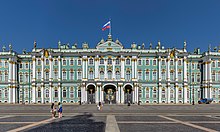
Back ቤተ መንግስት Amharic قصر Arabic Palaciu AST Saray Azerbaijani سارای AZB Paluocē BAT-SMG Палац Byelorussian Палац (пабудова) BE-X-OLD Дворец Bulgarian Palez Breton
This article may require copy editing for grammar, style, cohesion, tone, or spelling. (July 2023) |

A palace is a grand residence, often serving as a royal residence or the home for a head of state or some other high-ranking dignitary, such as a bishop or archbishop.[1] The word is derived from the Latin name palātium, for Palatine Hill in Rome which housed the Imperial residences.[1]
Most European languages have a version of the term (palats, palais, palazzo, palacio, etc.), and many use it for a wider range of buildings than English. In many parts of Europe, the equivalent term is also applied to large private houses in cities, especially of the aristocracy, for example the Italian palazzo; often the term for a large country house is different. Many historic palaces are now put to other uses such as parliaments, museums, hotels, or office buildings. The word is also sometimes used to describe a lavishly ornate building used for public entertainment or exhibitions[1] such as a movie palace.
A palace is normally distinguished from a castle in that the latter clearly is fortified or has the style of a fortification, whereas a palace does not.


© MMXXIII Rich X Search. We shall prevail. All rights reserved. Rich X Search